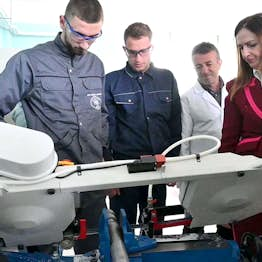In Kosovo, a bilateral agreement covering the period from 2023 to 2030 and a letter of understanding allocating €35 million for the 2023 – 2025 period were signed in Pristina in July 2022. The bilateral agreement reflects a strategic shift in Luxembourg’s cooperation approach in Kosovo, acknowledging its status as an upper middle-income country. Luxembourg Development Cooperation is thus adopting a strategy to diversify bilateral relations, intervening not only in basic social sectors such as health and vocational training but also in innovative areas such as digital transformation and renewable energy. In a multi-stakeholder approach, Luxembourg is undertaking numerous initiatives to strengthen links between the private sector, innovation networks and research bodies in both Kosovo and Luxembourg. New bilateral and multilateral projects were officially launched in autumn 2023.
Minister Bettel made a working visit to Kosovo in November 2024, during which the 9th bilateral commission between Kosovo and Luxembourg convened to take stock of the progress made under the cooperation partnership between the two countries. The visit also marked the launch of new cooperation tools involving the private sector. The many bilateral exchanges have also deepened the excellent relations and long-standing partnership between Luxembourg and Kosovo.
Luxembourg Development Cooperation seeks to promote sustainable economic growth, full and productive employment and decent work for all through vocational education and training through the Skills for Sustainable Jobs programme. Luxembourg focuses in particular on strengthening the technical and vocational education and training system to ensure that it provides the skills that are relevant to a constantly evolving labour market.
In order to contribute to Kosovo’s sustainable growth, Luxembourg Development Cooperation supports the Sustainable and Inclusive Growth programme, which plans to set up an innovation fund and a sovereign wealth fund. The programme also promotes digital transformation and cyber security capacity-building within the public administration. In the same area of intervention, Luxembourg Development Cooperation is supporting the Creative Industries Kosovo programme led by UNDP, to contribute to the development of an environment that will foster the growth of the creative economy.
In the field of energy transition, LuxDev is overseeing the Energy Transition and Climate Change Mitigation programme, aimed at supporting the transition to renewable energy and supporting the development and adoption of climate change mitigation measures, to promote Kosovo’s sustainable and inclusive socio-economic development. Luxembourg Development Cooperation is also co-financing, alongside Germany, a KfW programme to adapt Pristina’s existing district heating system.
Luxembourg Development Cooperation has been a long-standing partner of the Kosovo government in its efforts to strengthen the health sector, with a focus on expanding access to care and improving quality and governance under the Health programme. Through a collaborative approach, Luxembourg’s assistance aims to strengthen institutional capacity, improve health service delivery and address the needs of vulnerable communities across the country. In addition, Luxembourg Development Cooperation also supports UNICEF in the implementation of early childhood development programmes.
In support of Kosovo’s path towards European integration, alongside Norway Luxembourg is contributing to the Technical assistance in the context of European integration programme. This initiative focuses on strengthening the capacities of the ministries responsible for implementing the Stabilisation and Association Agreement (SAA), which provides the framework for Kosovo’s EU accession over a period of ten years. In order to fulfil its obligations under the SAA, Kosovo is expected to pursue democratic reforms, achieve social and economic development and gradually align its legal framework with EU legislation.
Finally, Luxembourg Development Cooperation provides support to civil society organisations in three areas of intervention, namely the economic and social empowerment of women, the promotion of the social and economic inclusion of minorities and marginalised groups, and independent media. Luxembourg Development Cooperation also supports the Kosovo Luxembourg Foundation, which works to reduce poverty in targeted municipalities in Kosovo by supporting individuals and small family-run businesses through training, financial support and the creation of partnerships.
Reference data
- Population (millions): 1,53
- GNI (per resident): 19,010
- Human Development Index (HDI): n.a.
- Life expectancy: 78
